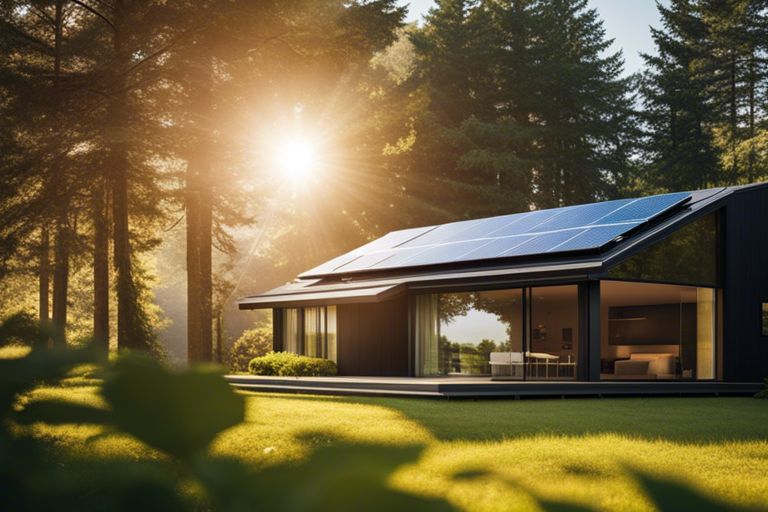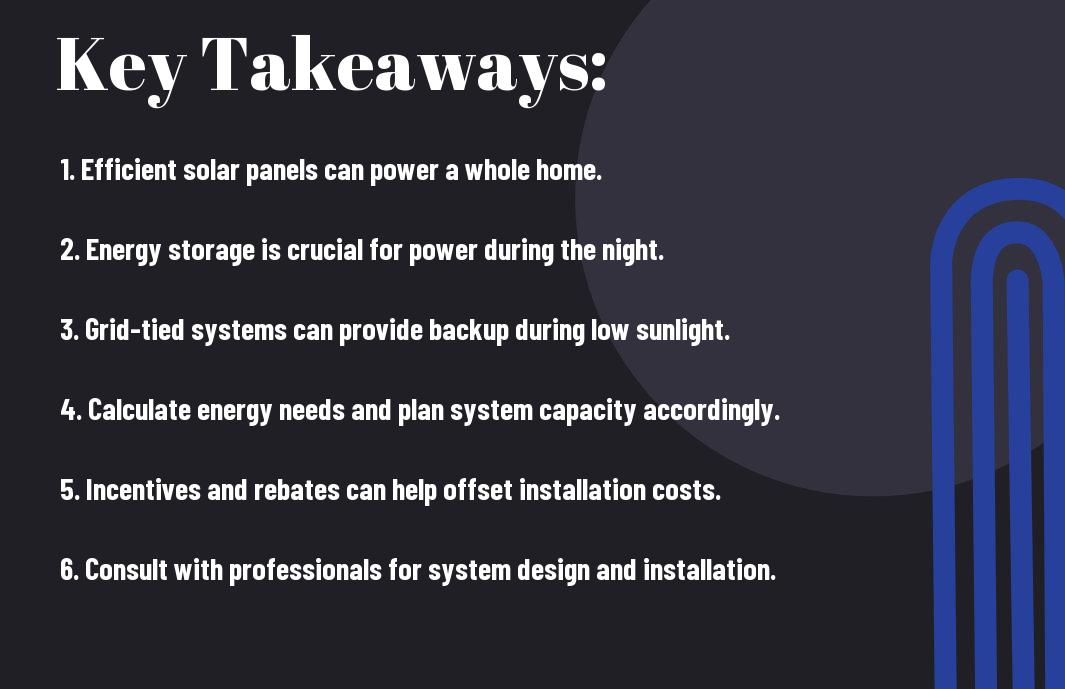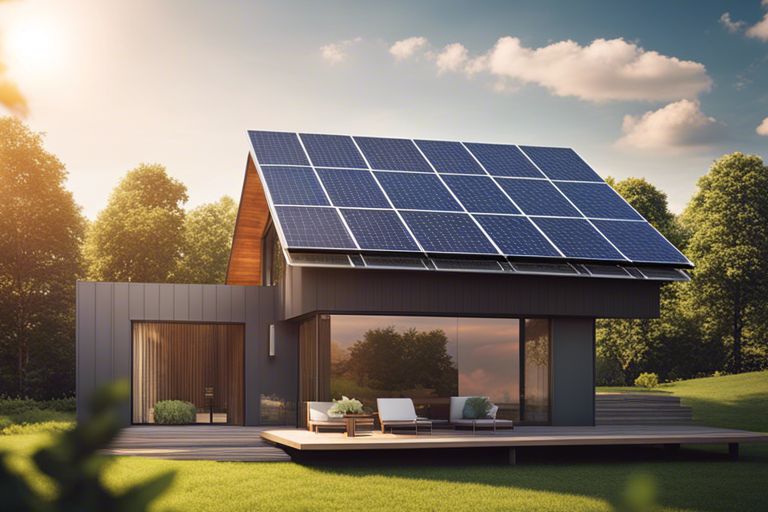You may be wondering if you can power your entire home with solar energy. As you explore the possibility of running your house solely on solar power, you’ll come across various factors to consider. From assessing your energy needs to understanding the efficiency of solar panels, there is much to ponder. To dive deeper into this topic and find out if running your entire household on solar energy is feasible, check out Can I Run My Whole House on Solar Power?.

Key Takeaways:
- Solar Panel Capacity: Ensure you have enough solar panels to generate the necessary power for your entire home.
- Battery Storage: Invest in a battery storage system to store excess power generated by solar panels for use during low sunlight periods.
- Energy Efficiency: Improve energy efficiency in your home by using energy-efficient appliances and practices to reduce the amount of power needed.
- Government Incentives: Check for available government incentives, rebates, and tax credits that can help offset the cost of installing a solar power system.
- Professional Installation: Hire a reputable solar panel installation company to ensure proper installation and maximize the efficiency of your solar power system.

The Potential of Solar Power
A
How Solar Panels Work
Powering your entire home with solar energy is a viable and sustainable option. Solar panels work by converting sunlight into electricity through photovoltaic cells. When sunlight hits these cells, it excites the electrons, generating an electric current. This electricity can then be used to power your home, reducing your dependence on traditional grid electricity.
Advantages of Solar Energy
An abundant and renewable source of energy, solar power offers numerous benefits. By harnessing the sun’s energy, you can significantly reduce your electricity bills and even earn credits through net metering. Additionally, solar energy is environmentally friendly, producing no greenhouse gas emissions or pollution during operation.
With advancements in technology, solar panels are becoming more efficient and affordable, making it easier for homeowners to invest in solar power systems. By tapping into this sustainable energy source, you can not only save money in the long run but also contribute to a cleaner and greener future for the planet.
Assessing Your Energy Needs
Clearly, before determining if you can power your entire home with solar energy, you need to assess your energy needs. This involves calculating your energy consumption and considering the various factors that affect your energy requirements.
Calculating Your Energy Consumption
Energy consumption can vary greatly depending on the size of your home, the number of occupants, your daily activities, and the appliances you use. To calculate your energy consumption, you can start by looking at your utility bills to determine your average monthly kilowatt-hour (kWh) usage. This will give you a baseline to work with when sizing a solar energy system for your home.
Factors Affecting Energy Requirements
- The location of your home: The amount of sunlight your home receives will impact how much energy your solar panels can produce.
- The size and orientation of your roof: A larger roof with a south-facing orientation will generally be more suitable for solar panels.
- Your energy efficiency: Improving the energy efficiency of your home can help reduce your overall energy consumption.
Factors such as the climate in your area, the time of year, and any shading from nearby trees or buildings can also affect your energy requirements. This is why it’s vital to consider all these factors when evaluating if you can power your entire home with solar energy.
Sizing Up Your Solar System
Determining the Right System Size
Not sure how to determine the right size of a solar system for your home? The first step is to assess your energy usage. Look at your past utility bills to get an idea of how much electricity you typically consume. This will help you calculate the size of the solar system needed to offset your usage.
Considering Roof Size and Orientation
Size matters when it comes to solar panels. When considering the size of your solar system, you also need to think about the available roof space and its orientation. A south-facing roof with limited shading is ideal for solar panel installation, as it receives the most sunlight throughout the day.
For instance, if your roof has a lot of obstructions like chimneys or skylights, it may limit the amount of available space for solar panels. In such cases, you may need to consider smaller panels or look into alternative mounting options to maximize sun exposure.

The Cost of Going Solar
Now, if you’re considering powering your entire home with solar energy, you may be wondering about the costs involved. To research deeper into this topic, you can read our blog post on Can Solar Energy Really Power an Entire House? [2023 Edition].
Initial Investment and Installation Costs
Solar energy systems require an initial investment for the purchase and installation of solar panels, inverters, batteries (if you choose to store energy), and other necessary equipment. The costs can vary depending on the size of your home, energy needs, location, and specific requirements. However, with advancements in technology and increasing demand for solar solutions, prices have become more competitive over the years.
Long-term Savings and Incentives
One of the significant advantages of going solar is the long-term savings you can enjoy on your energy bills. By generating your electricity from the sun, you can potentially reduce or even eliminate your monthly utility costs. Additionally, many governments and energy providers offer incentives, such as tax credits and rebates, to encourage homeowners to switch to solar power. These incentives can make the transition to solar even more affordable and attractive.
It’s crucial to consider not only the upfront costs but also the potential savings and incentives when evaluating the feasibility of powering your entire home with solar energy. Over time, the savings can outweigh the initial investment, making solar power a financially smart and sustainable choice for your household.
Overcoming Common Obstacles
For more information on whether you can run your house off solar panels without connecting them to the power company, check out this insightful discussion on Quora. Here, you will find valuable insights and experiences from experts and homeowners who have explored this option.
Addressing Intermittency Concerns
For those concerned about the intermittent nature of solar power and how it might affect powering your entire home, rest assured that advancements in technology have made great strides in addressing this issue. Innovations such as net metering, battery storage solutions, and hybrid systems that combine solar with other energy sources can help ensure a reliable power supply for your home.
Dealing with Energy Storage Limitations
One common obstacle when it comes to powering your entire home with solar energy is the limitations of energy storage. While batteries have improved over the years, storing excess energy generated during the day for use at night or on cloudy days can still be a challenge. However, with proper planning and the right storage solutions tailored to your energy needs, you can effectively manage and overcome these limitations.
The key to dealing with energy storage limitations is to understand your household’s energy consumption patterns and invest in a storage system that can meet your requirements. By optimizing your energy usage and implementing efficient storage solutions, you can ensure that your home stays powered even when the sun is not shining.
Real-World Examples and Success Stories
Residential Solar Power Successes
Your dream of powering your entire home with solar energy is not just a fantasy. Many homeowners have successfully transitioned to solar power and are reaping the benefits. Any doubts about the feasibility of residential solar power can be put to rest by looking at these success stories. From reducing electricity bills to contributing to a greener planet, the advantages of residential solar power are undeniable.
Commercial and Industrial Applications
To power an entire home with solar is an impressive feat, but what about larger-scale applications? Any doubts about whether solar energy can meet the demands of commercial and industrial settings can be dispelled by the numerous success stories in this sector. Businesses, factories, and even entire industrial parks are now running on solar power, saving costs and reducing their carbon footprint simultaneously.
Successes in commercial and industrial applications of solar power demonstrate the scalability and reliability of this renewable energy source. By harnessing the power of the sun, businesses are not only saving money but also positioning themselves as leaders in sustainability and environmental responsibility.
To wrap up
So, can you power your entire home with solar? The answer is a resounding yes, with the advancements in solar technology and the decreasing costs of installation. By properly assessing your energy needs, maximizing your solar panel output, and potentially incorporating energy storage solutions, you can significantly reduce or even eliminate your reliance on the traditional grid. Not only will this reduce your carbon footprint, but it can also lead to long-term savings on your energy bills.
FAQ
Q: Can solar power generate enough electricity to power my entire home?
A: Yes, with the right setup and sufficient solar panels, you can generate enough electricity from solar power to meet the energy needs of your entire home. It’s vital to calculate your energy consumption and design a system that can generate enough power to cover your usage.
Q: How many solar panels are needed to power a typical home?
A: The number of solar panels needed to power a typical home depends on factors such as the home’s energy consumption, roof size, panel efficiency, and local sunlight conditions. On average, a typical home may require anywhere from 20 to 40 solar panels to meet its electricity needs.
Q: Can I store excess solar energy for use when the sun is not shining?
A: Yes, excess solar energy can be stored using batteries for use during periods when the sun is not shining, such as at night or during cloudy days. With a battery storage system, you can store the surplus energy produced during the day and use it when needed, making your home more self-sufficient and resilient to power outages.
